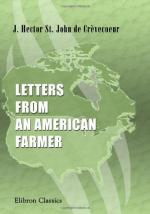As I have endeavoured to show you how Europeans become Americans; it may not be disagreeable to show you likewise how the various Christian sects introduced, wear out, and how religious indifference becomes prevalent. When any considerable number of a particular sect happen to dwell contiguous to each other, they immediately erect a temple, and there worship the Divinity agreeably to their own peculiar ideas. Nobody disturbs them. If any new sect springs up in Europe it may happen that many of its professors will come and settle in American. As they bring their zeal with them, they are at liberty to make proselytes if they can, and to build a meeting and to follow the dictates of their consciences; for neither the government nor any other power interferes. If they are peaceable subjects, and are industrious, what is it to their neighbours how and in what manner they think fit to address their prayers to the Supreme Being? But if the sectaries are not settled close together, if they are mixed with other denominations, their zeal will cool for want of fuel, and will be extinguished in a little time. Then the Americans become as to religion, what they are as to country, allied to all. In them the name of Englishman, Frenchman, and European is lost, and in like manner, the strict modes of Christianity as practised in Europe are lost also. This effect will extend itself still farther hereafter, and though this may appear to you as a strange idea, yet it is a very true one. I shall be able perhaps hereafter to explain myself better; in the meanwhile, let the following example serve as my first justification.
Let us suppose you and I to be travelling; we observe that in this house, to the right, lives a Catholic, who prays to God as he has been taught, and believes in transubstantiation; he works and raises wheat, he has a large family of children, all hale and robust; his belief, his prayers offend nobody. About one mile farther on the same road, his next neighbour may be a good honest plodding German Lutheran, who addresses himself to the same God, the God of all, agreeably to the modes he has been educated in, and believes in consubstantiation; by so doing he scandalises nobody; he also works in his fields, embellishes the earth, clears swamps, etc. What has the world to do with his Lutheran principles? He persecutes nobody, and nobody persecutes him, he visits his neighbours, and his neighbours visit him. Next to him lives a seceder, the most enthusiastic of all sectaries; his zeal is hot and fiery, but separated as he is from others of the same complexion, he has no congregation of his own to resort to, where he might cabal and mingle religious pride with worldly obstinacy. He likewise raises good crops, his house is handsomely painted, his orchard is one of the fairest in the neighbourhood. How does it concern the welfare of the country, or of the province at large, what this man’s religious sentiments are, or really




